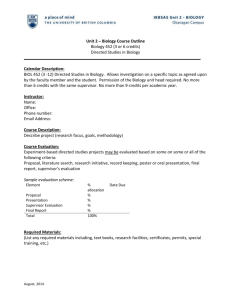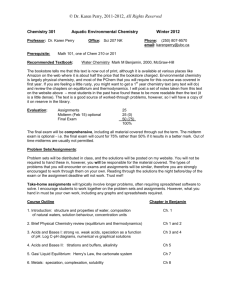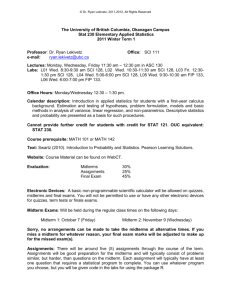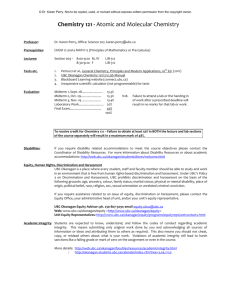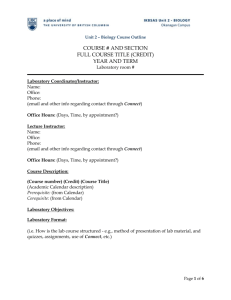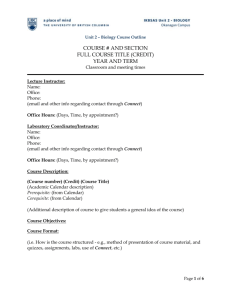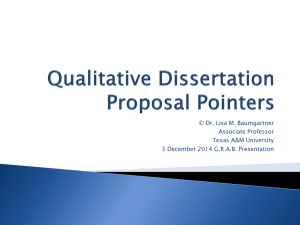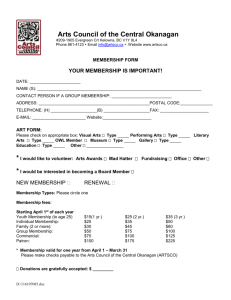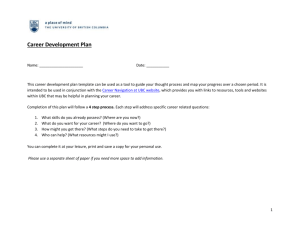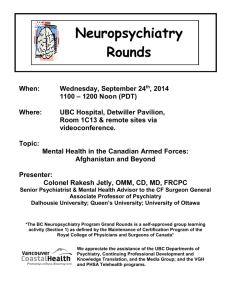educ 427 educating for humanity: citizenship through
advertisement
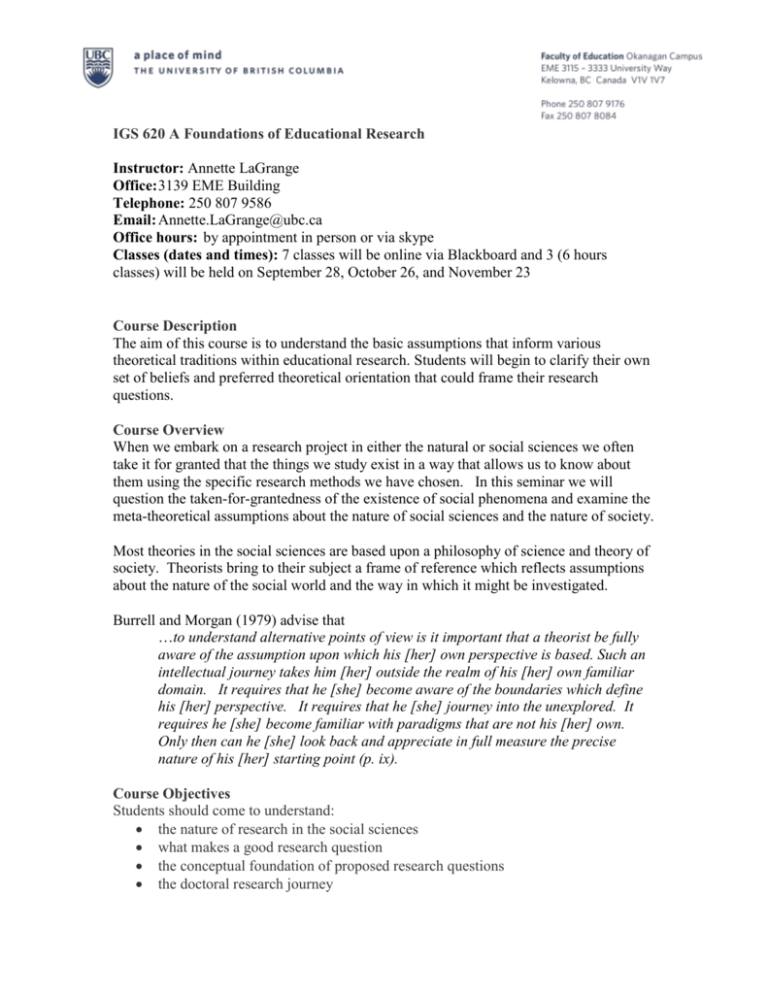
IGS 620 A Foundations of Educational Research Instructor: Annette LaGrange Office: 3139 EME Building Telephone: 250 807 9586 Email: Annette.LaGrange@ubc.ca Office hours: by appointment in person or via skype Classes (dates and times): 7 classes will be online via Blackboard and 3 (6 hours classes) will be held on September 28, October 26, and November 23 Course Description The aim of this course is to understand the basic assumptions that inform various theoretical traditions within educational research. Students will begin to clarify their own set of beliefs and preferred theoretical orientation that could frame their research questions. Course Overview When we embark on a research project in either the natural or social sciences we often take it for granted that the things we study exist in a way that allows us to know about them using the specific research methods we have chosen. In this seminar we will question the taken-for-grantedness of the existence of social phenomena and examine the meta-theoretical assumptions about the nature of social sciences and the nature of society. Most theories in the social sciences are based upon a philosophy of science and theory of society. Theorists bring to their subject a frame of reference which reflects assumptions about the nature of the social world and the way in which it might be investigated. Burrell and Morgan (1979) advise that …to understand alternative points of view is it important that a theorist be fully aware of the assumption upon which his [her] own perspective is based. Such an intellectual journey takes him [her] outside the realm of his [her] own familiar domain. It requires that he [she] become aware of the boundaries which define his [her] perspective. It requires that he [she] journey into the unexplored. It requires he [she] become familiar with paradigms that are not his [her] own. Only then can he [she] look back and appreciate in full measure the precise nature of his [her] starting point (p. ix). Course Objectives Students should come to understand: the nature of research in the social sciences what makes a good research question the conceptual foundation of proposed research questions the doctoral research journey Readings Required Text: Anfara, Jr., V.A. and Mertz, N.T. (Eds.) (2006). Theoretical frameworks in qualitative research. London: Sage. (Useful edited text that addresses the role and place of theoretical frameworks in qualitative research and explains process researchers used to find and apply theory to phenomenon they are investigating). Flyvbjerg, B. (2001) Making social science matter: Why social inquiry fails and how it can succeed again. West Nyack, NY, USA: Cambridge University Press. Recommended Texts: Crotty, M. (2004) The foundations of social research: Meaning and perspective in the research process. London: Sage. (This book will be of assistance in choosing your research method that is consistent with your theoretical perspective. This book has a qualitative oreintation). Bloomberg, L. and Volpe, M. (2008) Completing your qualitative dissertation: A roadmap from beginning to end. London: Sage. *Good on-line reference site for research methods created by Colorado State University Department of English graduate students: http://writing.colostate.edu/references/research.cfm Additional readings may be suggested during this course by both students and the instructor. Specific readings are suggested for some assignments. Assignments Assignment 1 (30%) Students will create a commonplace that will enable them to annotate their journey towards becoming an educational researcher. The commonplace book will be initiated at the beginning of the term and curated for online presentation on December 2. Suggestions for creating a commonplace book will be available in the first week of class. Assignment 2 Research Proposal (40%) Students will construct a research proposal that could be the foundation for their research dissertation (approximately 25 pages). The construction of this paper will evolve from a one-page paper examining a possible research focus and will be expanded collaboratively Page | 2 throughout the term. Students will post a copy of their proposal by November 18 and present their research proposal for discussion in class on November 23. The final proposal is due November 30. While this is an introductory course and many of you will not have identified your research topic for your dissertation, this exercise will give you experience in developing a research proposal that attends to the theoretical perspective. Expectations: The focus of the proposal is on the conceptual/theoretical framework rather than the research method. This will be a discussion rather than a defense of your proposal. The class is expected to have read the proposal and to prepare three questions for discussion. It maybe that in the course of the discussion that new questions emerge or that it goes in quite a different direction. As a critical friend you want to help the candidate clarify his or her thinking about his or her research. The objective of this exercise is to give you experience in critiquing research proposals based on your knowledge of the philosophical foundations of social science research, to get an idea of the kinds of questions you might be asked in an oral defense, and to receive feedback on your proposal. Suggested Additional Resources for writing your proposal: Locke, L., Spirduso, W., & Silverman, S. (2007). Proposals that work: A guide for planning dissertations and grant proposals (5th ed.). Thousand Oaks, CA: Sage. Rudestam, K., & Newton, R. (2007). Surviving your dissertation: A comprehensive guide to content and process (3rd ed.). Thousand Oaks, CA: Sage. Yates, L. (2004). What does good research look like? Berkshire, England: Open University Press. Assignment 3 Review of Doctoral Dissertation (30%) Due October 26 Select a dissertation or published research project that resonates with your own research interests. Provide a critical analysis of the dissertation with a focus on the theoretical framework and how it affected the study. Length: 20 pages maximum. Provide a brief overview of the study that forms the basis for a discussion of the theoretical framework including: Purpose, key research questions, methods employed, brief review of findings and conclusions. Page | 3 Provide a description of the theoretical framework used in the study and the discipline in which is originated. Comment on the appropriateness of the framework for the study and the effects of the framework on the research questions, design of the study, and the analysis reported. Discuss potential issues, problems or insights gained from use of this theory in the research and how it might inform your own research. References to assist in writing a review Tips on writing and critiquing the literature review: http://www.utoronto.ca/writing/litrev.html Letts, L., Wilkins, S., Law, M., Stewart, D., Bosch, J., & Westmorland, M., (2007) Guidelines for Critical Review of Qualitative Studies. http://www.usc.edu/hsc/ebnet/res/Guidelines.pdf Specific rubrics for assessing each assignment will be posted on the blackboard site. The following criteria will apply to all assignments: Content Is there substantive information (data) present that demonstrates careful and critical engagement and inquiry with the topic / task at hand? Is there a demonstrable understanding evident of the significant topic issues, perspectives, and assumptions raised by the inquiry? Is there a clear sense of where the author stands in relation to the topic, issues, perspectives, and assumptions identified? Is there a sophisticated ability to unpack, in a critical way, what is said/not said, done/not done, justified, taken for granted, implied and desired in the topic /task at hand? Is there an identifiable ability in the author’s product to relate the topic to her professional context? Form Products constructed should reflect the author’s ability to Organize the product into a reasonable and readable sequence such that there is evidence the product has been intentionally planned, developed, and realized; Show and/or tell a trace-able line of defendable thought grounding the product; Support interpretations and conclusions, including the appropriate use of critical evidence, Use varied textual forms, structures, and types effectively and aesthetically in order to indicate the meaning, relationship, and the importance of ideas / practices expressed and represented. Page | 4 The following grading scale will be used: Percentage (%) 90-100 85-89 80-84 76-79 72-75 68-71 64-67 60-63 55-59 50-54 0-49 Grade A+ A AB+ B BC+ C CD F (fail) Course Policies Attendance You are expected to attend each on campus seminar unless you inform me beforehand, are sick, or have an emergency. You are expected to actively participate in the online seminars/discussions Missed Class You are responsible for collecting missed materials from a classmate and must be up-todate by the following class. Assignments Assignment due dates are important as they correspond to class presentations. If for any reason you are unable to meet these expectations please discuss your situation with the instructor as soon as possible. Language and Formatting Correct use of language is one of the criteria included in the evaluation of all written assignments. All assignments must be written neatly or typed in 12 point font and submitted in class and in paper form. You must use correct grammar and spelling and standard writing conventions. Please write coherently and demonstrate your learning of class content. References should be in the recognized format of APA. You may check the library website for more information using the following link: http://web.ubc.ca/okanagan/library/citations.html. Academic Integrity The academic enterprise is founded on honesty, civility, and integrity. As members of this enterprise, all students are expected to know, understand, and follow the codes of conduct regarding academic integrity. At the most basic level, this means submitting only original work done by you and acknowledging all sources of information or ideas Page | 5 and attributing them to others as required. This also means you should not cheat, copy, or mislead others about what is your work. Violations of academic integrity (i.e., misconduct) lead to the breakdown of the academic enterprise, and therefore serious consequences arise and harsh sanctions are imposed. For example, incidences of plagiarism or cheating may result in a mark of zero on the assignment or exam and more serious consequences may apply if the matter is referred to the President’s Advisory Committee on Student Discipline. Careful records are kept in order to monitor and prevent recurrences. A more detailed description of academic integrity, including the University’s policies and procedures, may be found in the Academic Calendar at http://okanagan.students.ubc.ca/calendar/index.cfm?tree=3,54,111,0. Equity, Human Rights, Discrimination and Harassment UBC Okanagan is a place where every student, staff and faculty member should be able to study and work in an environment that is free from human rights-based discrimination and harassment. Under UBC’s Policy 3 on Discrimination and Harassment, UBC prohibits discrimination and harassment on the basis of the following grounds: age, ancestry, colour, family status, marital status, physical or mental disability, place of origin, political belief, race, religion, sex, sexual orientation or unrelated criminal conviction. If you require assistance related to an issue of equity, discrimination or harassment, please contact the Equity Office, your administrative head of unit, and/or your unit’s equity representative. Education Equity Representative: Catherine Broom: Catherine.broom@ubc.ca, 8078768 UBC Okanagan Equity Advisor: ph. 250-807-9291; email equity.ubco@ubc.ca Web: www.ubc.ca/okanagan/equity <http://www.ubc.ca/okanagan/equity> Unit Equity Representatives: http://www.ubc.ca/okanagan/equity/programs/equityreps/unitcontacts.html Page | 6
